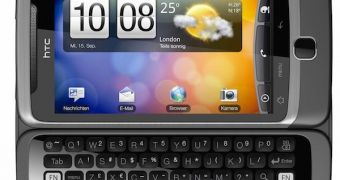In addition to the highly appealing HTC Desire HD, the Taiwanese smartphone designer HTC Corporation also announced the launch of a new slider in its family of Android-based devices today, the HTC Desire Z.
Resembling a lot with the newly announced T-Mobile G2 handset, the HTC Desire Z comes with a QWERTY keyboard, showing a similar design as the first Android phone did (T-Mobile G1), while also resembling the T-Mobile myTouch 3G Slide.
This is not the first time we hear about the Desire Z, that's for sure, but now it is official, and it hardware specifications have been unveiled to the world too.
A recent article on Engadget notes that the new device would be powered by a 800MHz Qualcomm MSM7230 processor, while sporting a 5-megapixel photo snapper with flash and HD video recording capabilities.
In other words, it seems that there are only a few differences between this device and the previously reported on T-Mobile G2, which might suggest that HTC is working on having its mobile phones available in as many markets as possible.
The specifications list of this Android-based mobile phone also includes HSPA+ and 802.11n connectivity options, just as the G2.
The smartphone packs a 3.7-inch LCD touchscreen display on the front, and is expected to prove a nice option for business users out there, it seems.
However, one of the main differences between the two would be the HTC Sense solution the phone maker pre-loaded on Desire Z, which is not available for G2's users.
The new Sense seems to be a greatly enhanced software solution from HTC, which would also offer cloud support and a series of new features.
“We’re excited to be taking the HTC Sense experience beyond the phone to a whole new level with a series of connected HTC services we call HTCSense.com,” Peter Chou, CEO of HTC Corporation, stated, according to a recent post on dynamicbusiness.
The Desire Z is expected to become available for purchase starting with October in Europe and Asia, and chances are that some carriers would have exclusivity on it, including Vodafone on some markets.

 14 DAY TRIAL //
14 DAY TRIAL //